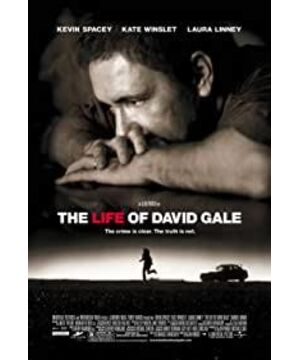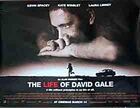The level of the director's storytelling and the control of the rhythm of the plot are quite good. The storyline is progressively tense, engaging, and ultimately enlightening. -I don't agree with your point of view, but I will defend to the death your right to express your opinion.
The film tells the story of several citizens fighting for the abolition of the death penalty.
The protagonist of the story, David Gale, is a professor of philosophy at the university and a member of a public welfare organization that abolishes the death penalty. David's colleague at university Constance Harraway is also a member of the group. Although some states in the United States have abolished the death penalty, many state governments still insist that the death penalty is an important means of maintaining social order. Texas, where David and Constance are located, ranks first among the states in the United States in terms of the number of executions per year. The resistance to the death penalty movement in Texas is a serious situation, but it also has a relatively high level of representation.
The killing machines in Texas prisons didn't stop for a moment because of David and Constance's efforts. Despite these objections, the state government rejected the civil proposal to abolish the death penalty as the system worked well. The source of all the confidence of the Texas government is that since the execution of the death penalty system, there has not been a wrongful conviction that led to the unjust death of a criminal suspect.
Members of the Abolition Group believe that:
1. It is morally wrong for one person to take the life of another for whatever reason. It is wrong whether criminals kill or bring criminals to justice in the name of law;
2. In fact, survey data show that the death penalty has no effect on reducing the crime rate.
The state government and those who support the death penalty believe that since ancient times, killing for life has been justified.
Whether the death penalty should be abolished or not is a relatively complex philosophical proposition, which will not be discussed in this article for the time being. A few years ago, Military Regulations saw another death penalty-themed movie "Dead Man Walk", and commented as follows:
"
Since it is wrong to kill, then it is wrong to kill in any form and for any reason. Sin, redemption-- This is an extremely complicated proposition. In the movie, when the victim's dentist uncle saw the tragic condition of the deceased niece, he said: Before that, he did not support the death penalty. Those who came would be afraid, would be cold, would cry, and would ask to wear a pair of clothes. Boots, will involuntarily dodge obstacles that stumble in front of them. They are people just like us, and we end him in the name of people.
"The
above is just a statement from the movie.
If a system has existed for thousands of years, there must be a reason for its existence, and its strong historical inertia. The state government and the majority of the public clearly cannot accept the idea of abolishing the death penalty for the time being. David and Constance Decided to take a radical approach.
Preconditions:
Rebellious female student Berlin seduces Professor David, the head of the department, and falsely accuses David of rape. Berlin realizes her rebellious idea of trampling on authority before being ordered to drop out of school. David is disgraced, unemployed, alcoholic, divorced, Don't see the children - can't live, can't die;
Constance suffers from leukemia and will die soon. The
plan is implemented:
Constance committed suicide in the kitchen, and the whole process of suicide was filmed on video;
David and his assistant Dusty fabricated the crime scene and made David kill Constance Fake;
David was tried, imprisoned, and defended negatively;
the court finally sentenced David to death.
In order to expand the influence of public opinion, David contacted Bitsey, a well-known magazine reporter three days before the execution, and agreed to accept her exclusive interview. The magazine paid David a sum of money for this. Fees for interviews from the Philippines. David insisted on his innocence in front of Bitsey, and induced Bitsey and his assistants to find the videotape of Constance's suicide before David was executed. Bitsey found the videotape, David had just been executed by the state government. The truth surfaced, public outcry, the state government The death penalty system is under unprecedented pressure.
David commissioned Dusty before his death to give the magazine's interview fee and the postcard of the female student Berlin's reflection - to his wife and children in Spain after his death. David also asked Dusty to send the Constance suicide "full version" tape to Bitsey in order to achieve "redemption" for Bitsey overwhelmed by the mind. Unlike the "abridged version" that Bitsey found himself, the full version of the videotape proves that Constance committed suicide with the help of David and Dusty, who collaborated to plan the entire incident. David's execution by the state government was the final step in the plan.
The absurdity of the whole story is that these people ended up calling the state to abolish the death penalty at the cost of death.
The film is told in flashbacks, cleverly connecting the whole story through journalist Bitsey. From the beginning of the film, Bitsey rushed out of the car with a smoking engine, ran wildly, and the scenes reappeared during the key plot, echoing before and after, like reincarnation, and the timelines of the front and rear stories were closely integrated.
Dusty has no lines, and is ghost-like, creating a tense and suspenseful atmosphere at the beginning of the film. The opera recording in the cabin, and even after the mission, Dusty's tears as he enjoys the opera in the theater, imbues the character and the entire story with a sense of sanctity and redemption.
Story Designers David and Constance had no memories of living in the execution of the plan, so they devoted themselves to the idea, not only without losing their spiritual power, but also adding rationality to the story itself.
Perhaps, the society is not ready yet.
View more about The Life of David Gale reviews











